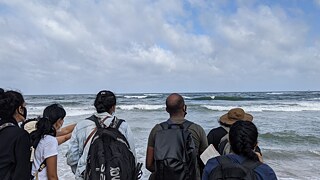Field Trip - Mount Lavinia Beach Coastline
House of kal Colombo had a momentous three-part field visit across three diverse landscapes that sparked up fascinating discourse and made for rich experiences.
© kal
1/20
Field Trip - Mount Lavinia Beach Coastline
The group met with the oceanographer Hafsa Jamel, who has been carrying out her own individual research along the Mount Lavinia Beach coastline, a beach popular for its multipurpose activities, situated in the heart of Colombo.
© kal
2/20
Field Trip - Mount Lavinia Beach Coastline
Hafsa Jamel's scientific observations are meshed with a subjective, emotional attachment to the sea and how it changes.
© kal
3/20
Field Trip - Mount Lavinia Beach Coastline
The House walked a stretch of 5 kilometres and were confronted with the overwhelming resistance and adaptation power that water has on animals, ecosystems and communities in the area.
© kal
4/20
Field Trip - Mount Lavinia Beach Coastline
The experience was analysed in terms of sound, objects, class systems, colonial and religious architecture and mannerisms, and the different ways to map a changing – or stagnant – landscape in the face of extreme political intervention that works against protecting natural infrastructures.
© kal
5/20
Field Trip - Mount Lavinia Beach Coastline
Field Trip - House of kal Colombo
© kal
6/20
Field Trip - Beira Lake
In the latter part of the day, the House went on a walk with artist Firi Rahman from the We Are From Here project around the Beira Lake, portraying the impact this rapid development has had on people, their livelihoods and homes and all that has changed before and after colonisation, as well as after the war.
© kal
7/20
Field Trip - Beira Lake
These intersecting timelines, looking at a place that was, that is and that will be, is the heart of "kal".
© kal
8/20
Field Trip - Beira Lake
"The most jarring part of walking through the city was constantly being observed by armed forces or stationed patrols. Whether it was past a new development project that would ultimately displace communities, or a quiet sit-down by the lake sketching on a notebook, we felt an unexplainable eerie-ness - from a tense silence to passive surveillance."
© kal
9/20
Field Trip - Beira Lake
"It was significantly different from the open experience at the beach that morning, albeit extremely interesting to look at architecture as a language of power, miliratisation and criminality, and the state that destroys nature just to insert it artificially in the corners and intersections of the city."
© kal
10/20
Field Trip - Beira Lake
"Ghost archives of the state were also discussed - who actually owns this land?"
© kal
11/20
Field Trip - Beira Lake
"Who is trying to reclaim it and how?"
© kal
12/20
Field Trip - Beira Lake
"How different would this walk have been 5 years ago - or 5 years from now?"
© kal
13/20
Field Trip - Wetlands
Day 2 started off with a scenic boat ride on a canal that snakes across Colombo, followed by a walk through the wetlands - that feels almost celestial and timeless upon reflections.
© kal
14/20
Field Trip - Wetlands
Artists and researchers Abdul Halik Azeez, Jacqueline Poloni and Meghal Perera encouraged the group to "project, learn and listen to" the wetlands by drawing on their own practices in sound, subversion, plant ecosystems and nature.
© kal
15/20
Field Trip - Wetlands
Studying the fluid relationship between the wetlands and the city was an ideal way to end the field visits, as it was an amalgamation of the two experiences the group had before, but in a slightly different, unique sense.
© kal
16/20
Field Trip - Wetlands
Researcher-writer Meghal introduced us to an almost-lost and lesser-known history of water hyacinths, that have a colonial past and a resistant future.
© kal
17/20
Field Trip - Wetlands
Jackie and Halik concurrently examined different forms of symbolisms and metaphors, and how we can find these among stimulating cities but also in an ever-buzzing, horizontally-existing space in nature - which also somehow is confronted by an intervention of the state; concrete slabs that were built in the middle of the wetlands without a vision, to high-rises in the distance trying to project a certain vision.
© kal
18/20
Field Trip - Wetlands
Residents partook in an activity that aimed to push the boundaries of language - how do certain symbols, structures or elements in the wetlands make us feel, and why? Do we feel a spark that goes beyond words?
© kal
19/20
Field Trip - Wetlands
The idea of "kal" rose here again, as the House envisioned the changes that will potentially take over these remote wetlands - Colombo, itself, being a large wetland.
© kal
20/20



















